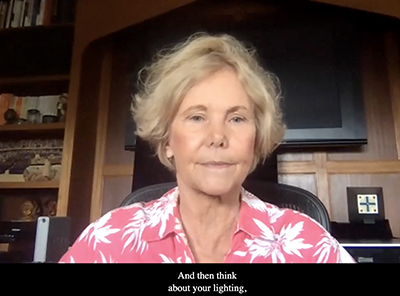The Chance to Attend Conferences Across the World Online

Everyone adjusted to the pandemic in many ways in their personal life and careers. For those of us in AccessComputing, we pivoted from on-site to online presentations, meetings, and events. As conferences moved online, I was able to take advantage by engaging in more discussions, delivering a multitude of presentations and poster sessions, and leading many online discussions. Many stakeholder groups at these events were discussing the issues surrounding the conversion of postsecondary on-site courses to online venues. In the past few years, there has also been a growth in diversity, equity and inclusion (DEI) initiatives and discussions nationwide. In response to these conference themes, I tailored talks about the accessible and inclusive design of online learning and the application of a universal design (UD) framework to underpin these practices to a wide variety of stakeholder groups. Focusing on accessibility and inclusion in computing, I presented at RESPECT, Consortium for Computing Sciences in Colleges, ACM SIGCSE, Computer Science Teachers Association, and HighEdWeb conferences. I also presented on these topics within accessible IT at Accessing Higher Ground and CSUN Assistive Technology conferences.
In relation to teaching and higher education, I reached stakeholders focused on pedagogy and the delivery of online and on-site courses in a keynote address at the NWeLearn conference and concurrent sessions at the Online Learning Consortium Innovate, Lilly, Teaching Innovation, American Association of Colleges and Universities conference on General Education Pedagogy, the Universal Design for Learning, ULDHE, and Higher Education Pedagogy conferences. I also spoke at the Association of American Colleges and Universities conference. DEI-focused practitioners and researchers were engaged in my presentations at the National Summit for Educational Equity; the Association of American Colleges and Universities (AAC&U) Conference on Diversity, Equity, and Student Success; NW Regional Equity Conference; National Summit for Educational Equity; and Inclusive Educators. I reached researchers and practitioners more specifically focused on disability at the Society for Disability Studies, Multiple Perspectives, Pacific Rim International, CUNY Accessibility, and ADHEAD conferences. Informal science learning professionals were reached at the American Alliance of Museums, Smithsonian Education Association; and University Professional and Continuing Education conferences.
This year I felt like I was living in the digital version of Dr. Seuss' Oh, The Places You’ll Go. The movement of on-site to online forums gave me an opportunity that I took advantage of—to attend conferences all over the country. One of the highlights was a keynote address I gave at the International Disability Inclusion Symposium hosted by the University of Tokyo titled “DO-IT Framework, Goals, Practices, and Collaborations in Asia.” I hope you too were able to find a silver lining in these challenging times.